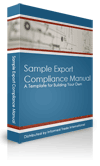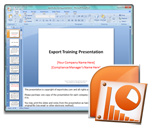ITAR Freight Forwarders
When I was a kid, my father used to provide me with a wealth of important “life lessons,” doled out in simple one-liners that I could carry with me as I grew older. One of my favorites was “If you’re going to run with the pack, make sure you’re the leader.” Another that has served me well throughout life was “Always use the right tool for the job.”
The same can be said when it comes to choosing the correct freight forwarder to manage the transport of your ITAR controlled goods. It’s important that you use the right forwarder for the job. As the manufacturer or source of USML goods, you have undoubtedly spent countless hours developing your corporate compliance program; ensuring that every aspect of your operation – from upper management, to sales, to shipping and receiving – is aware of the regulations and well trained.
We all know, however, that your responsibility for those goods does not end there. Once your product leaves your dock, you are still responsible for the transport of those goods to the foreign consignee or end user. For this reason, it’s crucial to your compliance program to ensure that the forwarder you choose is also fully aware of the complex requirements of the ITAR.
Just as your organization undoubtedly interviewed and hired a corporate ECO (Export Compliance Officer), an interview process of sorts should be undertaken in order to choose your freight forwarder. Be sure to conduct this “interview” at their facility. After all, you go to great lengths to ensure that your building is secure – shouldn’t the first step be to ensure that your potential forwarder’s building is also secure? Be direct – ask to see what security measures are in place to protect your product. If a forwarder refuses to allow you to visit their facility, be very wary about moving forward with them unless they can provide a legitimate reason for refusal.
Once you are satisfied that your goods will be secure in the interim from your facility to the port or airport of departure, request to sit with the operational personnel who will be processing your shipments. Be very direct with your questions and take notes. These can be maintained in your records for due diligence purposes. Here are some sample questions to get you started:
1. Are your operational personnel trained in the ITAR, and if so, where did they receive their training? How frequently do they receive this type of training?
2. Do you conduct in house training of this nature?
3. Do you have a copy of the ITAR on hand? (If they say yes, ask to see it and ensure that it is a current printing.)
4. What is the destination Control Statement for ITAR controlled goods, and why is it relevant to you – the forwarder? (This is a mistake I frequently see when auditing export documentation. 22 CFR 123.9(b) stipulates that the destination control statement must appear on both the invoice and the bill of lading. Most pre-printed bills of lading and air waybills are pre-printed with the Commerce Department’s EAR destination control statement. Therefore, If your forwarder is not physically placing the proper destination control statement on the transport document, you are in violation of 22 CFR 123.9 (b) – make sure they understand the difference between the two destination control statements.)
5. Do you have licensed customs brokers in house? (Although this may not be a “deal breaker,” having customs brokers on staff will make life much easier if you are dealing with DSP-73’s or repair items.)
6. Are you familiar with the most common licenses and what they represent? (They should be able to tell you the difference between a DSP-5, DSP-73, DSP-61 and know what a DSP-119 is used for)
7. Are you familiar with the most common exemptions? (Repair exemption, tradeshow exemption, models & mock-ups, Canadian exemptions, etc) If you want to really test their knowledge, ask them this – “In what circumstance can I not use the repair exemption 22 CFR 123.4(a) (1)?” If they are well trained they will be able to tell you that if your goods are of foreign manufacture, and need to be returned to the US for repair, this exemption cannot be used.
8. While you are on the subject of 22 CFR 123.4(a) (1), ask them what the proper procedure is for utilizing this exemption. The freight forwarder plays a crucial role here, as the exemption must be noted on both the entry document upon importation, and on exportation, both the exemption and the US Customs entry number must be indicated on the air waybill or bill of lading.
9. How do you determine whether or not something is SME (Significant Military Equipment)? A large number of exporters rely on their freight forwarder to process the AES (Automated Export System) transmission. Most forwarders will ask you to complete a shipper’s letter of instruction, which they utilize to complete the AES entry. The standard format of this form, however, does not have a block to indicate SME. If you are providing your freight forwarder with the proper category and sub-category for your item, i.e., Category XII (b), they should be able to tell you how they would come to the conclusion that this is indeed SME. As the AES specifically asks the question – “Is this Significant Military Equipment?” it’s crucial that they know how to determine this, and can demonstrate that to you.
10. What steps do you take to ensure that your partners overseas understand the implications of diversion? Another problem you face is making sure that everyone understands that your license is very specific. Intermediate consignees and end users (who are frequently unfamiliar with US regulations) often have more than one facility – perhaps an overflow warehouse or separate processing plant a few blocks away. Occasionally, the consignee will request that goods be delivered to such a facility. It is important that your freight forwarder takes the necessary precautions to ensure that their partners are aware that goods may only be delivered to the licensed address.
11. Will specific personnel be assigned to our account? Again – not a “deal breaker,” but we all feel more comfortable if we are working with the same people and not being bounced around from one person to the next.
12. What documentation do you normally provide to your exporters upon completion of a shipment? I am continually amazed by the number of exporters who tell me their freight forwarders do not provide them with copies of the AES transmission, bill of lading or air waybill, entry document, etc. Make sure they are willing and able to provide you with all the necessary documentation for your record-keeping responsibilities.
13. Have you handled ITAR goods in the past? If so, how long have you been handling goods of this nature? It’s important to get a sense of their experience. Everyone starts somewhere, but make sure they have some experience and are able to provide the service you need.
14. Can you provide references or letters of recommendation from other ITAR customers? This may be one of the most important questions you ask. If they are able to provide you with references, check them!
Once you have completed this grueling task of interviewing your potential freight forwarder, go through it a couple more times. Although most freight forwarders would love to be the only forwarder named on your license, (locking you into using their services) this ties your hands tremendously. Naming two or three freight forwarders on your license does not mean you have to utilize all of them. Use the one you are most comfortable with. However, having two or three freight forwarders named on your license will provide you with a built in “plan B,” in the event that something happens. Personnel changes happen. Mergers and acquisitions happen. What if you only have one forwarder listed on all your licenses and that forwarder is purchased by another company? If you are under contract delivery deadlines and suddenly have to stop shipping for a few weeks while you wait for a DSP-119 to be approved, the financial implications can be immense.
When you find a freight forwarder who meets your criteria, work hard to develop and maintain a solid relationship with them. They are your last defense and the final link in your export compliance program. It is important that you work together in a collaborative effort to sustain your goals. Remember – “Always use the right tool for the job.” Thanks Dad, I’ll keep that in mind…
Contributed by Deborah Dorsett
Forward Logistics Group
www.flg.com
Posted on July 15th, 2008 by keeton
Filed under: ITAR


I am looking for a ITAR freight forwrder in Miami, in order to handle my non letal wepon coming to <korea-Miami-Bogota
Best regards
Carlos vidal